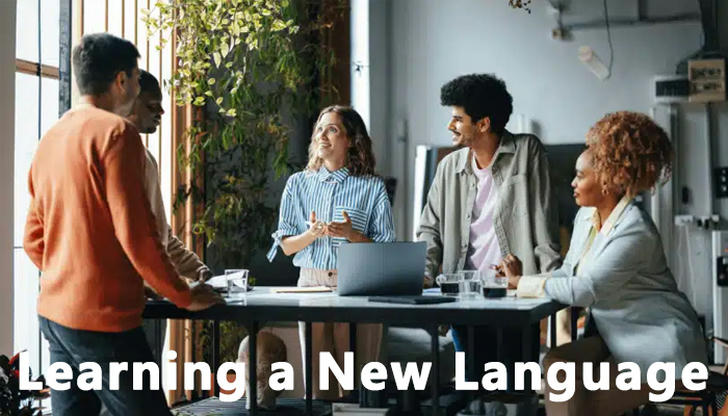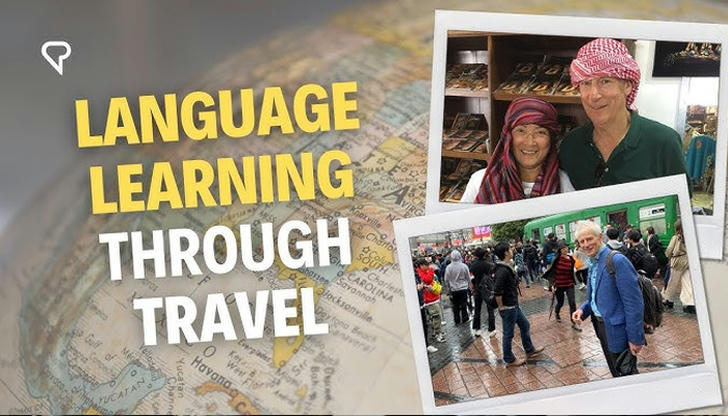The Fun of Learning a New Language: Expanding Your World and Connecting with Others
Books, movies, and music allow us to glimpse different cultures, but learning a new language provides a deeper connection to the world. It enables direct communication, enhances understanding of traditions, and even changes the way we think. While language learning requires effort, it can be an enjoyable and rewarding process with the right approach.

Expanding Your Worldview
Language is deeply tied to culture, history, and identity. When you learn a new language, you gain access to a whole new way of seeing the world. You can better appreciate foreign literature, music, and films in their original form, rather than relying on translations that might lose some of the original meaning.
For example, in Japanese, the concept of wabi-sabi describes a deep appreciation for imperfection and transience, which is hard to fully express in English. Similarly, the German word Fernweh captures the longing to travel and explore places far away. Learning a language allows you to think in new ways and embrace different worldviews.
Enhancing Communication and Connection
One of the greatest joys of learning a new language is the ability to connect with people from different backgrounds. Even if you only know a few phrases, locals often appreciate the effort and respond more warmly.
For example, imagine traveling to Italy and being able to order your favorite dish in Italian. Even a simple Grazie! (Thank you!) or Buongiorno! (Good morning!) can go a long way in building relationships. Language learning also enables you to form deep friendships with people you might not have connected with otherwise.
Boosting Career and Education Opportunities
In an increasingly globalized world, being bilingual or multilingual is a valuable asset. Many employers prefer candidates who can communicate with international clients or work in multicultural teams. Fields like tourism, international business, diplomacy, and translation actively seek people with language skills.
Moreover, learning a new language can open doors to studying abroad, receiving scholarships, and accessing educational resources that might not be available in your native language.
Strengthening Cognitive Abilities
Studies show that learning a new language improves brain function. Bilingual individuals tend to have better memory, problem-solving abilities, and multitasking skills.
Research also suggests that learning a second language can delay the onset of dementia and Alzheimer’s disease. Essentially, by learning a new language, you’re giving your brain a workout while having fun.
Fun and Effective Ways to Learn a New Language

Immersive Learning Through Media and Entertainment
One of the most enjoyable ways to learn a new language is through movies, TV shows, and music. Watching shows with subtitles in the target language helps you pick up natural speech patterns and vocabulary. For example:
Watching Money Heist (La Casa de Papel) in Spanish helps you get familiar with everyday Spanish phrases.
Listening to BTS songs and reading translated lyrics can enhance your understanding of Korean.
You can also follow social media influencers who speak your target language, read blogs, or even change your phone’s language settings for extra exposure.
Engaging in Real Conversations
Speaking is one of the fastest ways to improve your language skills. If you don’t have native speakers around, you can find language partners through apps like:
HelloTalk – Chat with native speakers who want to learn your language.
Tandem – Connect with people worldwide for language exchange.
iTalki – Take affordable lessons from native-speaking tutors.
Even if you make mistakes, practicing with real people builds confidence and makes learning more engaging.
Gamifying the Learning Experience
Turning language learning into a game keeps it fun and motivating. Apps like:
Duolingo – Uses streaks, rewards, and interactive exercises to keep you engaged.
Memrise – Helps with vocabulary retention using spaced repetition.
Anki – Uses flashcards to help you memorize words efficiently.
Setting daily goals, competing with friends, or rewarding yourself for milestones makes the process more enjoyable.
Traveling and Cultural Experiences

If possible, immersing yourself in a country where the language is spoken is one of the fastest ways to learn. When you’re surrounded by the language, you naturally absorb new words and phrases.
If travel isn’t an option, you can still experience cultural immersion by:
Attending local language meetups or cultural festivals.
Visiting authentic restaurants and trying to order in the target language.
Joining online communities where people speak the language.
Reading and Writing in the Target Language
Reading is an excellent way to expand vocabulary and comprehension. Start with:
Children’s books – Simple language and illustrations help with understanding.
Bilingual books – Side-by-side translations help you compare sentences.
Newspapers or blogs – Great for learning modern and practical vocabulary.
Writing in a journal, sending messages in the language, or even writing short stories can also reinforce learning.
Overcoming Challenges in Language Learning
Dealing with Fear and Self-Doubt
Many learners hesitate to speak because they fear making mistakes. However, mistakes are essential for learning. Instead of worrying about sounding perfect, focus on improving gradually. Native speakers are usually patient and appreciate your efforts.
Staying Consistent and Motivated
Consistency is key. Some tips to stay on track include:
Setting small, achievable goals (e.g., learning five new words a day).
Keeping a study routine that fits your lifestyle (e.g., 10 minutes a day).
Finding a study buddy or joining online communities for accountability.
Handling Plateaus and Frustration
There may be times when progress feels slow. To overcome this:
Try switching up learning methods (e.g., from textbooks to videos).
Focus on topics you enjoy (e.g., learning vocabulary related to hobbies).
Take breaks and revisit the language with fresh motivation.
Conclusion
Learning a new language provides opportunities for deeper cultural understanding, improved communication, and cognitive benefits. While challenges may arise, a variety of enjoyable learning methods can make the process more engaging. The journey of language learning is unique for everyone, and progress often comes through persistence and consistent exposure.
